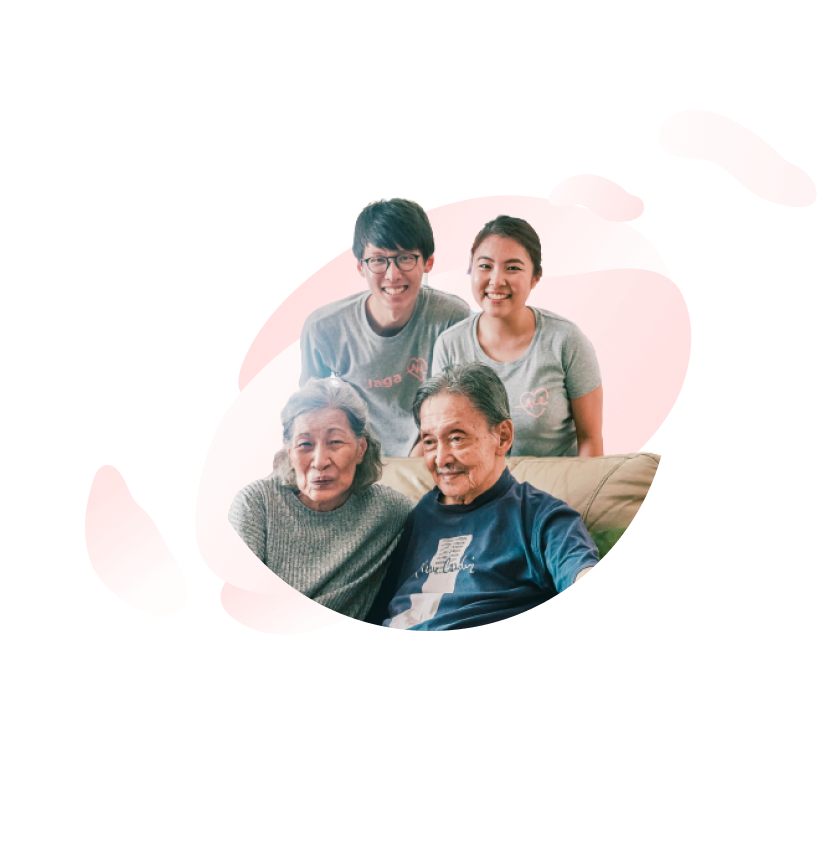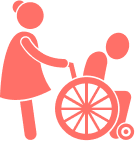Home Cancer Care Guide
A Cancer Care Guide for all Home Caregivers in Singapore.


Caring for a Loved One with Cancer at Home in Singapore
Home Care is a preferred hospice option for cancer patients to recuperate or spend their last few days in the comfort of their home. Be it breast cancer, lung cancer, colon cancer or prostrate cancer care at home, we have you covered! At Jaga-Me, we aim to optimize our patient’s quality of life and empower caregivers in providing compassionate care for their loved ones in Singapore. Find out how you can care better for your loved one with cancer in the comforts of your home.
Lifestyle Change: Cancer Patients
Cancer is a disease that happens when there is abnormal cell growth in our body. Without immediate treatment, it can lead to death. Cancer patients will have to adapt to a new daily routine of countless medical appointments, trips to the hospital and experiencing side effects from treatment. With countless changes happening, home cancer care services can step in to provide some sense of familiarity and peace in your life. Jaga-Me offers home respite care and professional nursing procedures so your loved one can get quality cancer care at home.
How to Manage the Side Effects of Cancer during Home Care?
- Pain
Cancer pain can be managed through pain medication as prescribed by your doctor. Seek help from your loved one’s nurse/doctor immediately if pain worsens or persists.
Pain medications are administered based on the level of pain your loved one is experiencing. If you or your loved one need help in administering pain medication through injections, you can find out more about Jaga-Me’s clinical procedure services here. Our cancer home care nurses in Singapore will help you with the medication and any other pain management which you might need.
- Hair Loss
Hair loss is an inevitable side effect of chemotherapy treatment.
Provide emotional support for your loved one if they need a listening ear. It is important for cancer patients to seek emotional support or confide in a counsellor.
Other alternatives you or your loved one can try out are wigs, scarves or hats. Try and see which option fits you or your loved one best!

How to Eat Healthy During Chemotherapy?
- No Appetite/ Weight Loss
Try eating small, frequent meals throughout the day.
Make the food more appealing by arranging them in smaller portions and on a smaller dining ware.
Avoid water or soup before every meal as this will cause a sense of fullness.
Add melted butter, oil or other fats to the food. This will help pack in more calories (energy).
Encourage your loved one to eat more protein and calorie-rich foods like full-fat dairy products (red/green/baked beans, peanut butter, eggs, tofu, meat, chicken and fish) to help increase their weight.
Other high-calorie snacks options you can consider are creamy soups, custards, jellies, puddings and dessert powders (these are easy to prepare).
Consider nutritional supplements if your loved one is not eating enough. Speak to their doctor, nurse or dietician to explore other options to effectively manage their cancer care at home in Singapore.
- Nausea
Take anti-nausea medications and drink more fluids when he/she is experiencing nausea or vomiting bouts to prevent dehydration.
If your loved one is experiencing nausea, you may want to try offering food that is at room temperature or cold.
Ensure that they don’t skip meals and snacks. Even if they do not have the appetite, they should eat a small snack. For many people, having an empty stomach makes nausea worse.
Choose food that is not overly sweet, spicy, greasy or has a strong odour.
If your loved one experiences nausea in the morning, having some dry crackers or bread can help.
Sip clear fluids (barley water, ginger tea and clear soups) between meals.
Some individuals find sour or salty food helpful in reducing nausea.
- Exhaustion
Encourage your loved one to eat smaller portions that are high in protein and energy (i.e. nutrient-dense food).
Try having meals together as a family as this encourages your loved one to eat more. Keep mealtimes flexible and enjoyable.
- Dryness in Mouth
If your loved one is experiencing dryness in the mouth avoid sour or salty food and beverages as they worsen the pain.
Avoid rough-textured food such as dry toast, crackers, granola which may scratch the inner linings of the mouth and throat.
Choose cool or lukewarm food and snacks (ice-cream and smoothies can be soothing).
Avoid alcohol, caffeine, tobacco and carbonated beverages.
Avoid spices such as chilli powder, curry, hot sauces and pepper which can irritate the mouth. Try seasoning your food with herbs instead.
Encourage your loved one to drink with a straw or use a teaspoon to help them with smaller bites.
If they have a dry mouth, moisten food with sauces or gravies.
- Constipation
Constipation is common and results in discomfort, pain and bloatedness.
Try adding more fibre to your loved one’s diet such as whole grain food, vegetables, fruits, beans and lentils.
Drink at least 8-10 cups of fluids lately. These include water, milk, juices, soups and other beverages. (Try to avoid caffeinated drinks – coffee and coca cola as they dehydrate the body).
Go for walks and some light exercises to help stimulate bowel movement. (Seek your doctor’s advice on performing light exercises)
Try sunfiber (prebiotic fibre supplement that is safe for infants to the elderly).
If your loved one has not passed motion in 3 or more days – inform your doctor or nurse.
- Diarrhoea
If your loved one experiences diarrhoea, try drinking plenty of mild or clear liquids (throughout the day) to prevent dehydration at room temperature.
Eat small, frequent meals and snacks during the day.
Avoid high-fibre, high-fat (greasy/fried), spicy or sweet food as they make diarrhoea worse. Try Sunfiber which is scientifically proven to help both constipation and diarrhoea.
Avoid raw fruits and vegetables with skin, seeds or dried fruits. When your loved one has recovered from diarrhoea, gradually introduce food with more fibre.
Change to a lactose-free dairy product or nutritional supplements.
Limit sugar-free gum and sweets with sorbitol (alcohol sugar) that can trigger diarrhoea.
Inform your loved one’s doctor if diarrhoea persists or increases. Observe your loved one’s stool if it has an unusual colour or odour.
- Bloating
Encourage small frequent meals.
Provide beverages in-between meals rather than during mealtimes.
Avoid overeating and chew food thoroughly before swallowing.
Avoid fried and greasy food – fats can stay in the stomach longer and give a sense of bloatedness.
Limit food and beverages that cause gas (soft drinks, dairy products, certain vegetables i.e. cabbage, cauliflower, apple, beans and lentils.)
Encourage light exercises like going for walks.
- Chewing and Swallowing Problems
Problems with chewing and swallowing can happen due to the side effects of cancer treatment like ulcers and inflammation or the cancer itself – it is advisable to get a speech therapist and find out if there are any risks of choking if your loved one has these problems.
Choose soft and moist food that are easy to swallow. E.g. Bread dipped in milk/milo, scrambled eggs, steam fish, ice cream and yoghurts.
Avoid sticky food like glutinous rice.
Cold food and drinks are helpful in soothing painful ulcers.
Try putting food of the same texture together i.e. thickening the soup that it is less runny and coats the rice/noodles properly. The thickened soup helps to moisten the noodles/rice and reduce the risks of liquids slipping down the throat too quickly.
Cut food into smaller pieces if chewing is a challenge.

How to Cope with Emotions?
- Take Charge of Your Life
Be in control. Understand the type of cancer and the treatment options that are available. You can always approach your doctor and nurses to better understand the type of procedures and treatments to follow for cancer care at home.
- Writing / Art / Music Therapy
Encourage your loved one or yourself to write and journal down your thoughts and emotions. Alternatively try expressing any thoughts through painting, drawing or even music.
- Talk to Someone
Talking to friends or family members about any concerns and troubles helps. Alternatively, you or your loved one can seek help from a professional counsellor. Singapore Cancer Society (SCS) has a strong team of counsellors and social workers if you or your loved one need someone to talk to. You can contact them at 6421 5877 or 6421 5878.
- Support Group
A support group is a great way for both caregivers and patients to seek help and share their experience with others. Do not be alone on this journey to recovery. Singapore Cancer Society (SCS) conducts support group sessions for cancer patients. If you have any enquiries you can call them @ 6499 9132.
Palliative Care Option
Many people have the misconception that palliative care is for patients who are near death. However, palliative care options can be introduced at the early stages of cancer treatment. Palliative care helps manage the various side effects of chemotherapy treatment. As mentioned above, it is very tough for a cancer patient to go through all the pain and cycles of chemotherapy treatment. Along with the lifestyle changes and unexpected outcomes that define cancer, there are psychological aspects which are also crucial for effective cancer care at home in Singapore. It is a holistic care that provides patients with a more comfortable journey to recovery. Check out our comprehensive palliative care guide on how you can receive palliative care in the comfort of your home.
Jaga-Me Can Help
At Jaga-Me, we fully understand your concerns and difficulties about home cancer care in Singapore .Cancer is a devastating disease which causes disruptions in the lives of patients and their families at the same time. You don’t have to be alone during this stressful and painful time. Let our experience be your guide and let our home nursing professionals be your companions to help you navigate through the difficult stages of cancer care at home. To ease your burden, we provide high quality home care for your loved one so you can relax and take a breather. Get in touch with us to learn more about how we can help you.












